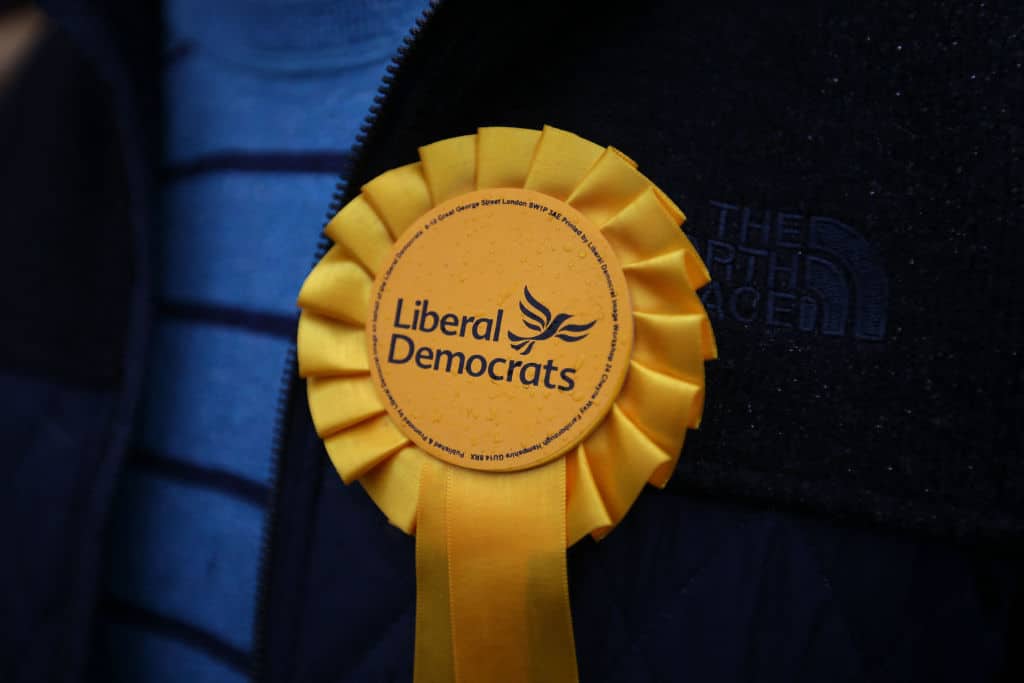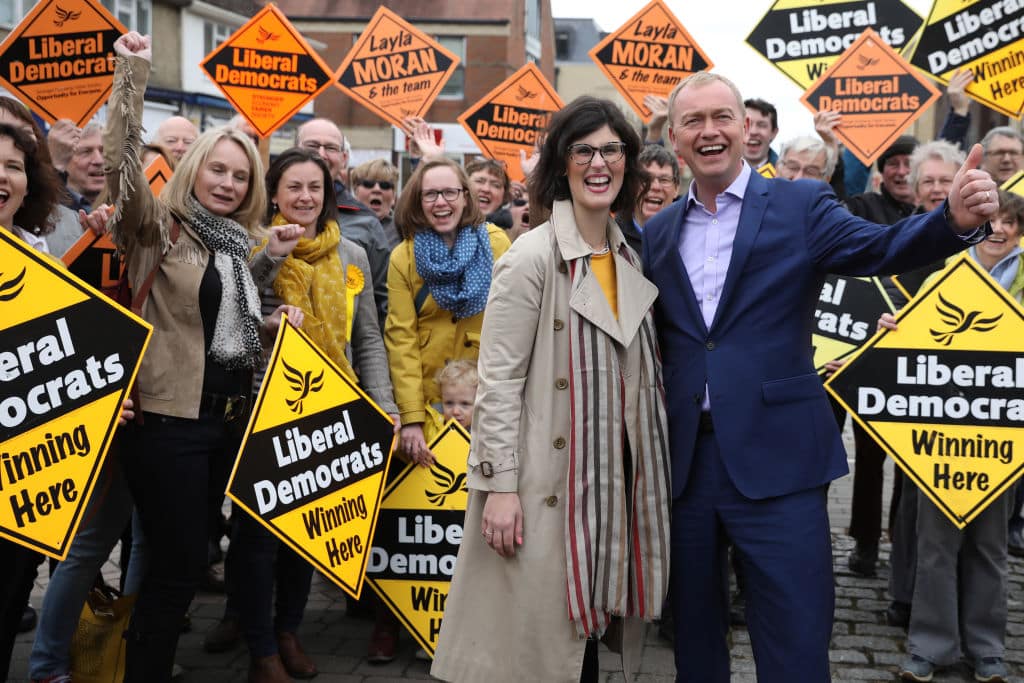LGBTQ+ Liberal Democrats quitting over party’s controversial definition of transphobia

Ed Davey, leader of the Liberal Democrats. (Ian Forsyth/Getty)
LGBTQ+ Liberal Democrats are quitting the party after senior officials revised a transphobia statement to protect “gender critical” views.
There was outcry among LGBTQ+ Liberal Democrats and allies when the party’s revised “formal definition” of transphobia leaked online.
Days later, the party formally published its new statement during Trans Awareness Week. On their website, the Liberal Democrats say the definition was revised in light of “recent legal cases” which have brought “greater clarity to the interpretation of the law in this area”.
The new definition says the party rejects “all prejudice and discrimination based upon race, ethnicity, caste, heritage, class, religion or belief, age, disability, sex, gender identity or sexual orientation”.
While the statement says disciplinary action “may be taken against members who exhibit transphobic behaviour”, it also states: “Holding and expressing gender critical views, whether in internal debates or publicly, is protected by law”.
Members of LGBT+ Lib Dems, the party’s LGBTQ+ group, have told PinkNews that they’ve been left “upset” by the new definition.
PinkNews understands that some party members have quit the Lib Dems entirely over the new transphobia definition.
Liberal Democrats have ‘lost numbers’ over transphobia statement
Charley Hasted, vice chair of LGBT+ Lib Dems, told PinkNews that their group knew the definition was being revised and that they were consulted on it in advance – but their recommendations were ultimately not taken into account.
According to Hasted, LGBT+ Lib Dems advised the party to seek further legal advice and to consider precedents set in two cases which were decided upon by the European Court of Human Rights.
However, the party appears to have ignored their advice, Hasted says.
“We’ve lost numbers, and frankly, we have more members threatening to go over this,” Hasted says, adding that they personally know “at least three” who have quit citing the new transphobia definition as the reason.

A supporter wears a Liberal Democrats rosette. (DANIEL LEAL/AFP via Getty)
“I think anything from the party that doesn’t include a commitment to get the [legal] advice that LGBT+ Lib Dems specifically said they should be getting is going to lead to more people leaving.”
Hasted is particularly frustrated by the new definition – and the way it was released – because it came shortly after trans and non-binary party members had a meeting with Liberal Democrats leader Ed Davey, where they talked about how they party could better support trans people.
“It’s this disconnect that keeps happening,” Hasted says. The whole affair has made the party “look awful”, they say.
It’s mainly one person. I’m not going to say who it is, but it’s one person who throws his weight around a lot.
“That’s not who we want to be in the party in the main. We’ve got a few people who are a problem and they are creating a problem, and it didn’t need to happen.
“We know that at least one of those members tried to push for the definition to go even harder than it did.”
In the end, they think the party tried to strike a “middle ground” between what LGBTQ+ members were saying and what “gender critical” campaigners wanted.
“It’s mainly one person. I’m not going to say who it is, but it’s one person who throws his weight around a lot.”
Much of the commentary on social media has focused on the decision to publish the revised definition during Trans Awareness Week, a decision Hasted describes as “shocking” and “appalling”.
They believe it was leaked deliberately in the lead up to Trans Awareness Week in a bid to “hurt trans people as much as they could”.
“The key point is this is being fought. There are thousands of Lib Dem members who are fighting this because we don’t agree with it,” Hasted says.
‘Pro-trans majority’
Gareth Lewis, chair of LGBT+ Lib Dems, still harbours hope the definition will be revised again in the short term.
“I don’t think anyone is very pleased about it including the people who voted to pass it. I think people felt it was something that had to be done,” he says.
Lewis says a new federal board and council have just been elected and that they will come into force in January – a move which could potentially pave the way for a further revision.
“There’s now a pro-trans rights majority on most wings whereas previously it was 50/50,” Lewis says.
“We’re having a lot of conversations with the party leadership involved in these sorts of things and I think there is a general feeling that this hasn’t gone well and that something needs to be done quite drastically to fix it,” they say.
Lewis believes the statement was revised in the first place because the party is too “risk averse”.
“I think that represents a big problem for our party,” they say, adding that the party is too inclined to “buckle” too quickly on issues it should stand firm on.
It’s not just grassroots members who have been left disappointed by the revised definition – some of the party’s most senior figures have also expressed their dissatisfaction.
Nobody deserves to be the victim of misogyny, homophobia, and in the same way nobody deserves to be misgendered or deadnamed.
Liberal Democrats MP Layla Moran urged the party to “listen” to LGBTQ+ people on the issue of transphobia.
“I share the disappointment of our trans siblings regarding the way the change in definition has transpired and urge the party as a whole to keep listening and trying to do better,” Moran told PinkNews.

Liberal Democrat MP Layla Moran. (Dan Kitwood/Getty)
She continued: “The Liberal Democrats have a proud record of fighting for all LGBT+ rights. We believe in the safety, dignity and wellbeing of every individual.
“In parliament we are campaigning for a total ban on so-called conversion therapy, including protections for trans and intersex people, and for reform to the outdated Gender Recognition Act.
“We will always fight for every person to feel not just accepted but celebrated and supported by society to lead fulfilled, productive lives – whatever that means for them.”
Cleo Madeleine, communication officer at Gendered Intelligence, said the fiasco shows the extent to which “the divisiveness of the culture war” has infiltrated politics.
“It’s not about saying, you have to believe a certain thing to be a member of a political party – it’s about saying, everyone has a right to participate in politics on an even footing,” Madeleine says.
“Nobody deserves to be the victim of misogyny, homophobia, and in the same way nobody deserves to be misgendered or deadnamed.
“We really hope that the Lib Dems, particularly with their chequered past on LGBT+ rights, stand firm on this.”
When contacted by PinkNews, a spokesperson for the Liberal Democrats said: “Following two legal cases that established new precedents, the party commissioned legal advice which was put to the federal board – the most senior elected governing body in the party.
“The Board voted in favour of the published definition of transphobia which was the strongest option available consistent with that legal advice. We will continue to support trans people within our party, through our policies about gender recognition which are clear, and through our independent complaints system which has zero tolerance for transphobic cases of bullying and harassment.”

